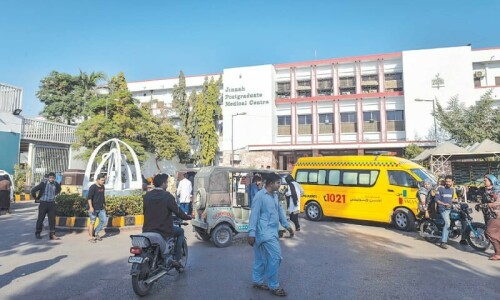KARACHI: High burden of mosquito-borne diseases remains a serious public health concern in the province, which reported a death from malaria and more than 10,000 cases from the infections in two days, it emerged on Tuesday.
The health department figures show that a woman died of malaria on Sept 30 at Liaquat University Hospital in Hyderabad, raising the death toll from the disease to five in Sindh.
A total of 5.511 cases of malaria were reported on Oct 4 and 4,644 cases on Oct 3. More than 600 cases of dengue were reported across Sindh over the past two days.
Official stats show that all divisions of Sindh are badly affected by malaria except Karachi, which remains in the grip of dengue fever.
Thirty-nine deaths have been reported from the disease since May in Karachi that saw more than 6,000 cases of dengue last month alone.
Sources said that city’s fumigation campaigns had little impact on the populations of mosquito and its larvae had been found thriving at more than 40 sites in Karachi during a recently-conducted survey.
This information, they said, was shared during a meeting chaired by the provincial health minister on Tuesday. Officials informed the minister that 46 sites in Karachi East, Central and Malir were found positive for mosquito larvae breeding during a survey conducted between July and September.
They observed that though there had been a decline in the trends for dengue infection, it was difficult to say whether that pattern would continue as both October and November were seen as dengue season in Karachi.
Officials shared that malaria data was possibly being underreported as the government data was being sourced from health facilities and many patients might be getting symptomatic treatment at home without being screened for the illness.
A majority of private labs, it was pointed out, were not sharing their data for dengue and malaria though most health facilities, both in the public and private, were sending regular reports on vector-borne diseases.
In her remarks, health minister Dr Azra Fazal Pechuho stated that local governments with the help of district health officers could create a more accurate mapping of vector hotspots, emphasising the need for more entomological surveys and setting up a vector-borne diseases control room and diverting Covid resources to vector control.
She also called for increased surveillance of water resources given the detection of Naegleria fowleri from samples collected from a locality.
Published in Dawn, October 5th, 2022













































Dear visitor, the comments section is undergoing an overhaul and will return soon.